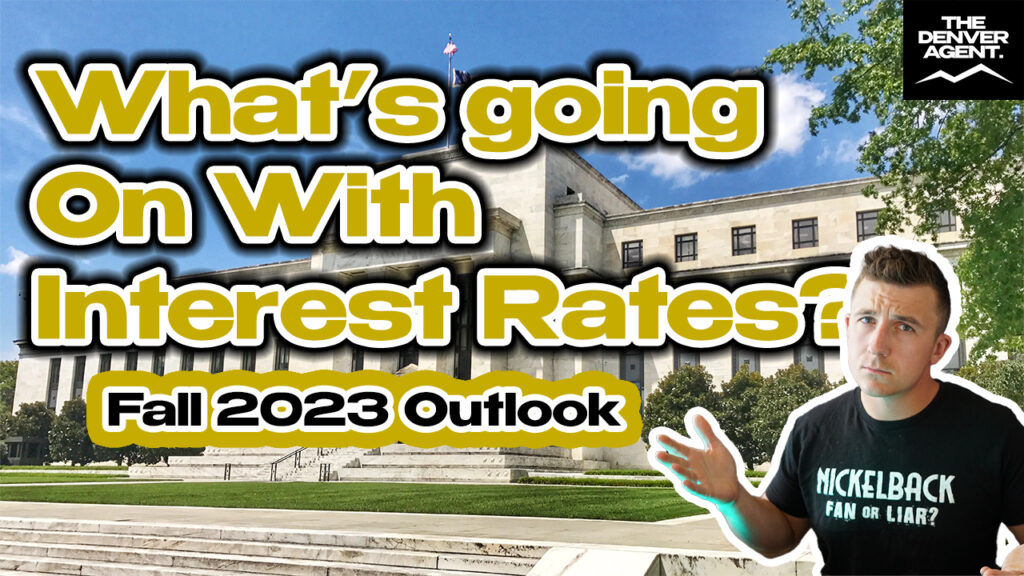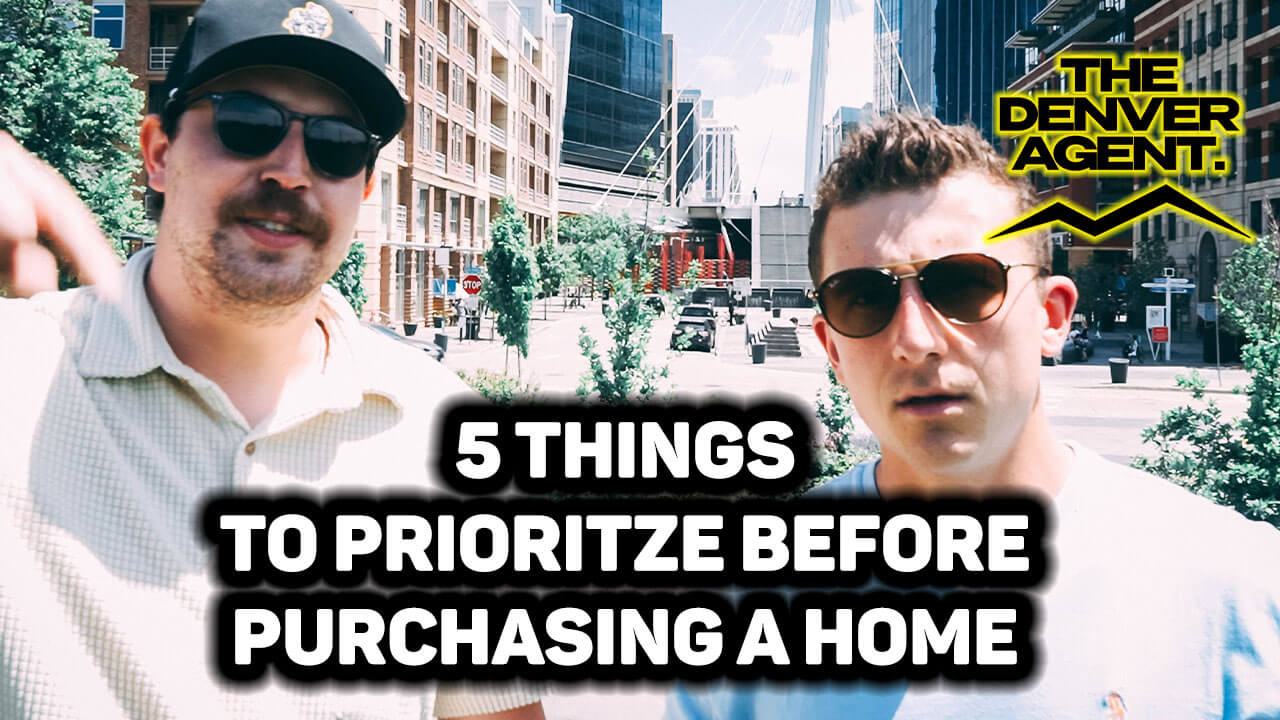Interest rates are a hot subject in the contemporary real estate market. You are probably asking yourself, “What about the current interest rates?” Why are rates so high and where are they headed?”
For this reason, we will dissect the position of current interest rates and its future trajectory. We will also offer some useful tips on how to proceed in the current interest rate climate. I am Ryan Lang, a licensed realtor in Colorado. Therefore, one more thing I will do is look at what the rates mean for you as a potential homeowner.
So, are you ready to explore the current interest rates and how they can affect home ownership? Let’s get started!
If you are too busy to read the whole article, check out our YouTube video below for a summary of what’s going on with current interest rates; a fall 2023 outlook.
What is Good with Interest Rates?
The pulse of the real estate market is the interest rate. It is a key variable dictating success or failure for buyers and homeowners. The interest rates got to an All-Time High (ATH) since the year 2000. As of 2023, the current interest rates are the highest in more than two decades. All these have a direct correlation to issues with the Federal Reserve. The big question is, when will the rates go down?
The increased current interest rates have in turn made borrowing more expensive. And that has the potential to affect the dream of owning a home. It also means that any incremental spike in the present interest rates will translate to much more expensive monthly mortgage payments. That again means, lower purchasing capacity for a new home.
Honestly, it is hard to imagine when the present interest rates will normalize. But are you planning to buy a house? Then, you should adjust to this climate instead of waiting for a dramatic fall in interest rates.
Why Are Rates So High, and Will They Stay That Way?
Many have been inquiring why are rates so high or keep rising. It is as if they were on their way up to infinity. Also, when will the rates go down? The high rates are a result of several factors. One reason is that the Federal Reserve has continuously moved the rates upwards over the past few years. These are rates that last occurred decades ago. The Federal Reserve is the key entity responsible for changing rates.
The rate primarily reflects a robust U.S. economy. Now, the agency argues that the higher interest rates will help counter the growing inflation. Current interest rates also depend greatly on the relationship between China and the United States.
Global inflation raises concerns due to China’s extensive currency printing that triggers current interest rates globally. Given the subtle interaction among these factors, it is probable that the current interest rates will remain high. Thereby, it becomes necessary for observation among homebuyers and investors.
1. A Strong and Healthy Economy:
One significant basis for the current rise in interest rates in the United States lies in the robust nature of the U.S. economy. Although rates are at a 22-year peak, the economy remains buoyant.
A healthy GDP growth rate is one of the economic indicators that showcase a vibrant economy. Such stability shows the resilience of the U.S. financial system. Americans keep trading and spending their money. It sends signals that they trust the economy to remain strong. As a result, the economy withstands much higher current interest rates to solve inflation and establish economic stability.
2. Battle Against Inflation: Not Yet at a Healthy Level:
For the most part, the Federal Reserve’s decision to raise the interest rates is due to its war against inflation. Undoubtedly, uncontrolled inflations could do a lot of damage to any economy. That will further result in higher living costs and a reduction in buying power.
Therefore, to sustain inflation at a desirable level, the Federal Reserve opted for the high current interest rates. The strategic move will also help curb inflation. Thus, it reflects the importance given by the central bank to ensure the stability of the US economy. Therefore these high current interest rates are a calculated measure to sustain a balanced economy.
3. International Impact: China’s Monetary Stance Causing More Inflation:
The world is an integrated economy where what we do can have international repercussions. One integral piece in the jigsaw puzzle is China and its furious printing of trillions of dollars.
In the USA, inflation is one of the ripple effects of Chinese monetary policies. It highlights a need for high current interest rates since the economies are highly interdependent. Such actions will help shield America’s economy from the devastating impacts of inflation thousands of miles away. These international dynamics become necessary for strategic monetary policy and continued vigilance.
When Will the Rate Hikes Stop?
The path toward the stabilization of interest rates is a complex one. So, many would-be homeowners want to know ‘when will the rates go down?’ Determining the new “neutral” rate for the economy is a must for the US. And that’s something the Federal Reserve is doing painstakingly.
People must know that finding a solution to interest rate issues may take almost a year. Unintentionally, others may propose an expedited refinancing arrangement in the same year. However, the US needs to address the issue with caution with the intent to reach a new equilibrium for current interest rates. Long-term realistic expectations and perspectives will steer the current rates in the right direction.
What Should a Homebuyer Do?
It is only possible to buy a home in such a prolonged high current interest rates environment. But such actions should depend on an informed decision.
1. Don’t Wait: Marry the Home, Date the Rate:
Although you may consider delaying your loan for current interest rates to go down. But in reality, the rates may remain high for several years. Instead of trying to “time” the market, it may make more sense to lock in the current rate.
It’s a bit like marrying the home and dating the rate. Interest rates are variables that fluctuate with time. However, the house that you purchase is for a lifetime. The gain in equity and value of your home is likely to overcome this additional amount on interest payment even in the initial years.
2. Ask for Seller Concessions:
Don’t forget your negotiation skills when entering the real estate market. Talk with sellers about the idea of a concession to reduce some financial burdens. These concessions may include covering some of your closing costs or lowering your interest rate. It may not result in a significant reduction in the current interest rates. But you could enjoy cheaper monthly mortgage payments
The above action could free up some extra funds for improving your new home or saving for future investments. Remember, in the real estate business, intelligent negotiations can be your best ally.
3. Take Advantage of Lower Home Values:
2. Ask for Seller Concessions:
High current interest rates limit the number of qualified buyers in the market. Therefore, it might force sellers to lower their home prices. Now, that’s good for you as a buyer since it results in lower home values. However, immediately after rates decline and more buyers come into the market, home prices would increase. It may be worth paying extra interest now. That’s because you can reap the benefits of any equity or increase in value when rates fall.
Conclusion
So, the existing situation of the current interest rates may pose some difficulty for potential homeowners. Do you want to know when will the rates go down? Well, it seems likely that rates will stay high for several more years. Therefore trying to “time the market” or expecting a quick drop seems unrealistic.
However, concentrate on adapting to the market, and select the most appropriate options in the given situation. Try “marrying the home and dating the rate”, “asking for concessions”, and taking advantage of low home prices. You can still make your dream of owning a home come true. Do not allow the current interest rate climate to discourage you from making this significant life investment.
Consult a Realtor Today:
If you have any questions or concerns about current interest rates, feel free to reach out to me. Are you thinking of buying, selling, or investing in the Colorado real estate environment? Or do you have questions on real estate in general? I’m here to help you navigate the complex world of Denver real estate. We could hook up over the weekend or so. Let’s sip coffee or drink beer together. Maybe we could play golf and then drive around possible real estate sites of interest. I remain your Denver real estate agent, Ryan Lang.
Disclaimer: This article does not serve as financial advice. Please consult a financial advisor about the Denver housing market interest rates and forecast. But you can speak with us for a real estate professional or personalized guidance.
How Long Does It Take to Sell a Home in Colorado?
The time it takes to sell a home in Colorado varies depending on market conditions and other factors like the price and condition of your home. It may only take a few weeks in a strong market, but it could take several months in a slow market.
What are the Benefits of Being a First-Time Home Seller in Colorado?
As a first-time home seller in Colorado, you may enjoy some advantages, including:
Less emotional attachment: As a first-time seller, you might have little feelings about the property, making it easier to negotiate and decide based on market conditions.
Greater negotiating power: If your property is in high demand, you may be better positioned to negotiate a higher price.
No previous sales history: Potential buyers might see you as more flexible and open to negotiation if you have not sold a property before.
No past real estate mistakes: As a first-time seller, you likely haven’t made any errors in previous real estate transactions, giving you a clean slate and more peace of mind.
Opportunity to learn: Selling your first home can be a learning experience, allowing you to gain knowledge and insights into the Colorado real estate market and the home-selling process.
What Should I Consider Before Selling My Colorado Home?
Before selling your Colorado home, consider the following questions:
What is your motivation for selling? – Understanding your reasons can help you make informed decisions and set realistic expectations.
What is your desired selling price? – To establish a target price, consider current market conditions and recent sales of similar homes in your area.
Are you willing to make repairs or renovations? – Consider the improvements you may need to make to attract potential buyers and increase your home’s value.
How will you market your home? – Determine the most effective methods for advertising and promoting your property, such as hiring a Colorado real estate agent, listing your home online, or hosting open houses.
What terms of sale are you willing to accept? – Consider factors like the closing date, contingencies, and the buyer’s down payment amount.
How do you plan to handle negotiations and closing? – Decide whether a real estate agent or a lawyer will handle the negotiations and closing, and be aware of the fees and expenses involved.
Are you familiar with Colorado’s real estate laws and regulations? – Familiarize yourself with local real estate laws and regulations, such as tax rules, zoning laws, and other legal requirements.
By considering these questions and being well-informed, you can make selling your Colorado home smoother and more successful.







